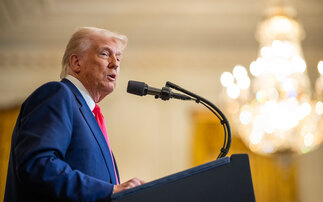Writing exclusively for BusinessGreen, Shadow Chancellor Ed Balls says a Labour government would provide certainty for clean energy investors and commission a review of resource security
Labour is determined to deliver an economy which generates more good jobs and higher living standards for all. To deliver this getting energy policy right for the next 30 years will be key.
Government working with industry can unlock major investment and huge numbers of jobs in order to secure our energy future. In the coming decades all countries will have to generate much more energy using clean sources. The alternative is devastating climate change, ever rising prices and energy insecurity.
Delaying the transition to a low carbon economy will mean an expensive rushed transition later.
Labour's approach is clear: We will both help bill payers and get investment. We will freeze energy prices until 2017 and give the regulator the power to cut prices this winter. In the long term it is our reforms to our energy market, pushing efficiency and action on sustainable supply that will help tackle energy prices in the future.
This contrasts sharply with the record of this Government. The last five years have seen only dither, missed opportunities and short termism.
The UK has tumbled down the league tables for attractiveness for investment in green energy. Why has this happened? Faced with the choice between short-termist nods to hard-line Tory opinion or the strategic leadership that Britain needs, the Chancellor has chosen the politically easy but economically reckless path.
In four key areas we will put right this Government's failure.
First: on policy certainty. The Government is formally committed to carbon targets for 2050 through the Climate Change Act. But the independent Committee on Climate Change says that this target will require largely decarbonising electricity by 2030. And yet the Chancellor has repeatedly blocked this target. By failing to show the scale of ambition and certainty of policy needed to effectively de-risk investment he has undermined business investment and job creation.
We will do what the investors are calling for and set out a clear, legal target to decarbonise power by 2030.
At the same time he is gambling our energy future on an all-out dash for fracked gas. Ignoring scepticism from the industry themselves that it can be delivered in the coming years.
Of course Britain needs a secure gas supply in the decades ahead. So Labour will support efforts to secure new domestic gas supply - subject to the real safety and environmental concerns that must be addressed.
But a balanced and low-carbon energy will need gas, renewable energy and, in our view, nuclear too. So we will end the Government's ideological attempts to block onshore wind - the most cost-effective source of renewable energy. And we will plan ahead - with a National Infrastructure Commission - as recommended by Sir John Armitt - which will set out a vision for what this country needs in the next 30 years. The draft remit I published last month made it clear that that we are determined as part of that to deliver on energy, and energy efficiency.
Second: on supporting investment. The Ernst and Young survey of attractiveness for renewables investment shows that the UK has fallen to its lowest level for 12 years.
The Government's indecision and dither means the main tool we have for giving investors an idea of our energy future, the current 'Levy Control Framework' will run out after 2020 and the Government has given no indication about what investors can expect afterwards.
Investors simply do not know what the market will look like in 2020 at the very time when they are deciding where in the world to make their investments for that time period. Industry tells me that this is hitting investment - not just in renewables but in carbon capture and in nuclear too.
And despite Ministers claiming the credit for setting up the Green Investment Bank which Labour proposed, they have consistently undermined it.
The Chancellor arbitrarily tied the decision to give the bank proper borrowing powers to him meeting his target on the national debt. The uncertainty means neither co-investors nor the wider sector are able to plan ahead - and Labour has made clear we will end that uncertainty.
We want the public to benefit from a changing energy market as well. As a strong supporter of the Co-Operative movement I deeply regret the uncertainty created before the budget as to Energy Co-ops ability to access the existing tax breaks renewable energy projects. I will ensure that communities can continue to invest in and share in the return from new wind farms or solar projects.
And we will ask the FCA to ensure that regulatory burdens do not un-necessarily impede these important projects.
Third: on reducing demand. I see the value of treating energy efficiency as an infrastructure priority. It generates jobs, keeps homes warm and helps us meet our climate targets. Despite the hopes of the construction industry the Government has weakened Labour's zero carbon homes scheme. And the Green Deal, which replaced previous successful domestic energy efficiency schemes, has been a total flop with just 5,000 homes having had measures installed in two years - fewer than 50 homes a week.
That's why Labour has pledged to replace these failing schemes and to retrofit five million homes over 10 years. And we will work with industry to strengthen zero carbon homes standards.
Finally: on leadership. One of the most powerful examples of this Government's short termism is on resource scarcity more widely.
George Osborne's Treasury has refused even to look at the problem and argued that the link between resource security and UK growth is too "speculative".
This could not be further from the truth. Of the letters to the Chancellor from the Bank of England that explain missing the inflation target, over half have referenced resource price shocks as a significant factor. One study showed that in 2011 that over one third of company profits warnings were linked to resource prices.
EEF, the manufacturers' associations is campaigning for this review alongside Friends of the Earth - not usually the most comfortable of bedfellows. A Labour Treasury would listen to our manufacturers and do this review.
And because we intend for the UK to lead rather than follow on energy and the environment we will work with our EU partners to set clear global goals on climate change and to lead from the front in the run up to the Paris 2015 global talks, just as we did in Government.
It is time to end the mixed signals that are causing confusion and deterring investment by posing a false choice - whether between giving the public a fair deal and driving investment or between action on climate action and action on the cost of living.
Next week Caroline Flint and Maria Eagle will be setting out more detail on Labour's Green Plan. This is a better plan which backs investors who want to create high productivity and good jobs in the low carbon sectors of the future and to back people dealing with the cost of living crisis.
The costs of failure to our environment are well known. But the costs to our long term prosperity and security are just as great.
Ed Balls is Labour's shadow chancellor







